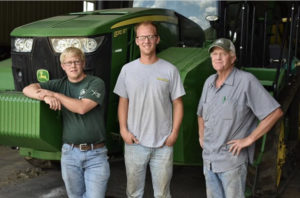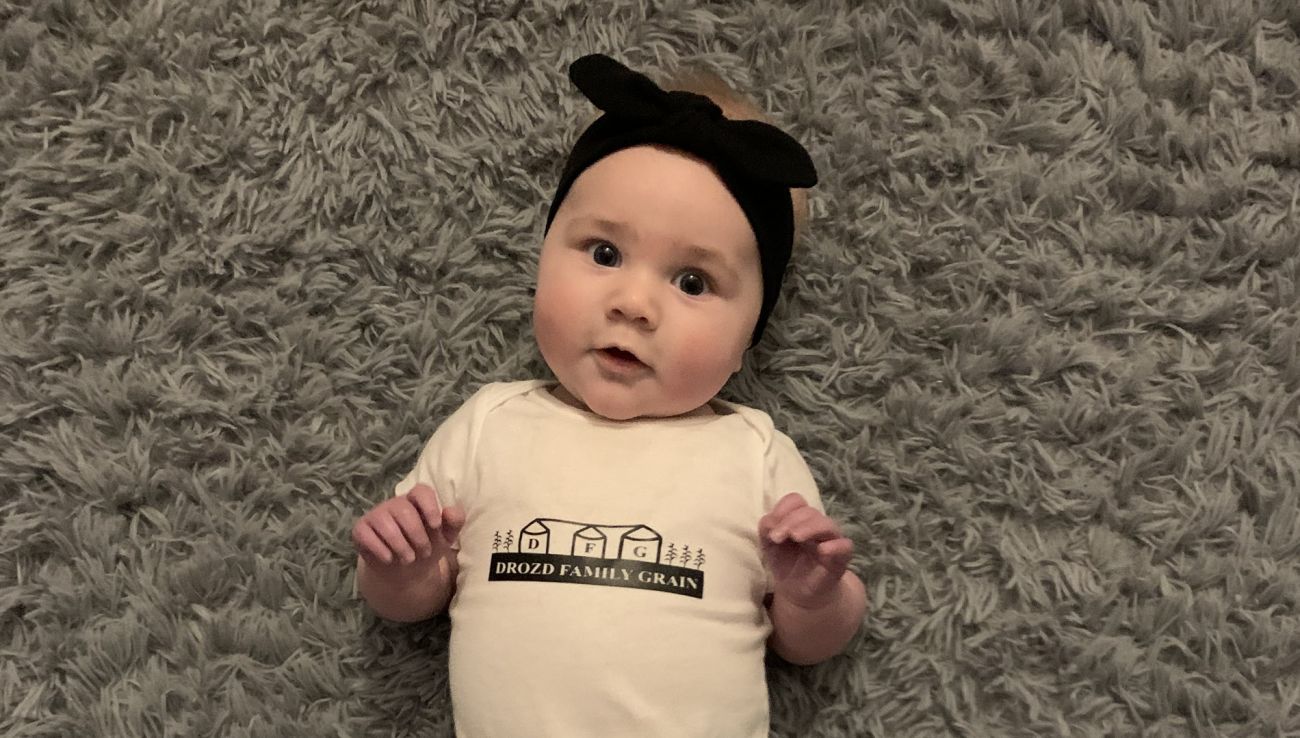From Seed to Yield: Growing a Family Farming Legacy

First Financial Bank
As the third generation in agriculture, Ryan Drozd of Drozd Family Grain is busy producing more than row crops. He and his family are adding new stories, connections and opportunities to the family’s business.
Can you tell us about your farm? What do you produce?
My dad, brother and I are in partnership. My mom and wife are also active in the business. We have 7500 acres of corn and soybeans here in Allegan, Michigan.
Yield is what sets us apart. We try to focus on yield and take a step back and see what things are most efficient at getting the highest yield. We have to be really proactive and progressive about what yields the most and does so efficiently – getting the most of every dollar.

Have you always wanted to be a farmer? What’s the history of farming in your family?
Yes, I’ve been row crop farming my whole life. I studied farm management in college. When I graduated in 2017 and my brother graduated high school, we formed the partnership with my dad. My dad has operated farms since the ‘70s.
And my grandfather started us down this path.
He came here from Chicago 75 years ago, opening a Pioneer Seed Dealership – one of the oldest in the country and the first in Michigan. He was a pioneer in his own right, doing a lot of experimental work and bringing many practices to small family farms of Michigan. He was one of the first to use nitrogen on corn and one of the first to take a strong look at the Western Bean Cutworm. For many years he also had a large chicken operation with laying hens.
Why farming for you?
There is so much variety in farming. Such a family aspect to it. Never doing the same thing every day. You get to create your lifestyle – and I love that.
What was your biggest challenge starting out?
I didn’t know how many things you have to get structured and organized, with the legal stuff, the back and forth communications and the paperwork, there is a lot to get in order. Though I wasn’t around then, I can only imagine it was easier to start up when my dad did it in the ‘70s. It seems much more complicated now.
Of course, the challenge is really that the world feels bigger and more complex.
My dad and I take care of the marketing.
There are so many different factors that we’ve never dealt with before. We have to take into account more global issues; for example, there isn’t live trading anymore. It’s all electronic now, with wild swings in pricing in an instant. It’s not as easy as going to your local grain elevator anymore.

Do you have some clients you work with regularly?
Yes. On the input side of things, we have two retailers we work pretty closely with and who keep us well connected. One is a good family friend. The other is in a town just north of where we live and we’ve also developed a close relationship with them.
We subscribe to several different marketing services across the country to build our network of connections. There’s lots of information out there about the marketplace and opportunities – you just have to know where to find it.

Any advice you’d give to people who are just starting out? What should they know?
One piece of advice – do business with people who have the same ideals and thought processes as you and it will be a lot easier in the long run.
A great example is when we began working with Kevin Stith and Kathy Daily of First Financial Bank. It was just as important that we interviewed them as much as they interviewed us. It’s how we learned that we did have the same ideals and thought processes. They listened intently to us and really heard what we had to say.
How did you meet the First Financial Bank Team?
We were introduced by a friend of my dad. It all started when we were in transition.
My dad had been partners with my uncle and we wanted to create a new entity with my dad, my brother and me. Dad’s friend wanted to introduce us to folks who he thought could be helpful.
We met with Kathy (Daily) several times, then worked with Kevin (Stith) for a bit. We kept having conversation after conversation. We had the opportunity to see that we had the same ideas and plans – and they could really help us achieve our goals.
We had learned from our old mistakes. With our old farm, we had a bank that treated our family badly. That lesson was useful. You learn how you want to be treated – and how you don’t want to be treated.
Any other recommendations?
Have your paperwork ready before the bank asks you for it. It helps to stay one step ahead.
Pay attention to detail and listen to other people. We are well connected with farmers all over the country. It’s important for us to network with our friends in Nebraska, Texas, Virginia , and Missouri – really all over the place. It helps to know what’s happening all over the country.
As farmers, we are under so much stress.
It’s good to have someone to talk to, so keep up your relationships. Keep doing things to remind you why you love farming and share with others who understand. Do other things you enjoy to relieve stress. It’s getting more challenging out there each year – and I’m just starting out.
Nothing is slowing down. Technology is changing at a rapid pace – recommend keeping up with it.
What are your plans moving forward?
We want to keep investing and growing the farm at a rate we are comfortable with. We definitely want to keep tackling our debts. It’s important for us to improve on what we have, so we can keep building.
As crazy as the environment is, it is still providing us opportunity. It’s very important to keep the relationship going that we have with the bank, maintain the assets we have and allow us to continue to grow.

What Kinds of Software Do Farmers Need?
The more you can reduce the guesswork, the more profitable your farm may be. That’s where agricultural software comes in.

How to Get Your Loan Decision Faster
Have you ever applied for a loan and only have it sit on your lender’s desk for days without an answer?

Well Prepared Financials Reflect Good Management Skills
Good production numbers are great, but management skills are a must in today’s environment of tight margins and the endless pressures from third parties.

